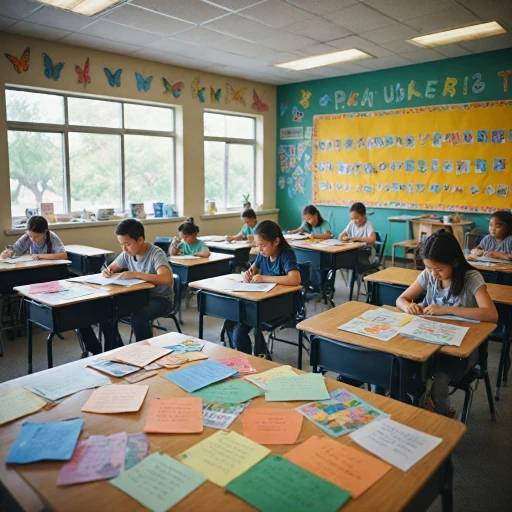
Understanding the Importance of Thank You Notes
Recognizing the Impact of Gratitude
In the world of nonprofit organizations, volunteers are the lifeblood that keeps many community projects and events thriving. These individuals dedicate their time, energy, and often their personal resources to support causes they are passionate about. Crafting a heartfelt thank you message is not just a matter of courtesy; it's a vital aspect of volunteer management that can solidify the bond between volunteers and the organization. Taking the time to express appreciation for their hard work and commitment can have profound effects. It can boost volunteer morale, encourage ongoing involvement, and even inspire new individuals to join the cause. Writing a thank letter that acknowledges the specific contributions and efforts of volunteers is a powerful way to show gratitude. A well-thought-out thank note reflects the impact their work has made, both on the organization and the community it serves. As a best practice, coordinators and volunteer coordinators should regularly offer such expressions of gratitude, whether through personal letters or public acknowledgments. Utilize email addresses and phone numbers to tailor these communications effectively, making your volunteers feel seen and valued. For more insights on the importance of gratitude and crafting poignant messages, you might find our article on writing a heartfelt thank you note to your instructor beneficial.Elements of a Meaningful Thank You Note
Key Components for a Memorable Thank You Note
Crafting a thank you note for volunteers involves more than a casual acknowledgment; it's an art that conveys appreciation, impact, and sincerity. Here are the primary elements to include in your thank you note:- Greeting and Personalization: Begin with a heartfelt salutation, such as "Dear Volunteer," to create a personal touch. Use the volunteer's name if possible, as personalization shows you value them as individuals.
- Express Gratitude Clearly: Start with a direct expression of gratitude. Use phrases like "thank you for your hard work" or "we appreciate your dedication." This sets the tone for the rest of the message.
- Highlight Specific Contributions: Mention the volunteer's specific efforts and how they contributed to the event or organization. Detailed acknowledgments demonstrate that you noticed and appreciated their unique contributions.
- Share the Impact: Outline the tangible impacts the volunteer's work had on the community or project. For example, "Your support was crucial in delivering food to over 300 families during the event." This reinforces the significance of their efforts.
- Reflect a Genuine Tone: Use a conversational style that reflects sincerity. Avoid overly formal language that might seem impersonal. Consider sharing a brief anecdote or memory to strengthen the emotional connection.
- Close with Continued Appreciation: End with a note of ongoing gratitude and encourage continuous involvement. You might say, "We look forward to your continued support in our nonprofit's future endeavors." A closing that invites further engagement helps foster a sense of community and belonging.
Real-Life Example of a Thank You Note for Volunteers
Example of a Heartfelt Thank You Note for Volunteers
Crafting a heartfelt thank you message for volunteers is an art that combines sincerity with specificity. A well-written thank you note not only acknowledges the hard work and time volunteers dedicate but also strengthens the bond between them and the organization. Here is a real-life example of how to express genuine appreciation:
Dear Volunteer,
We are incredibly grateful for your unwavering support and dedication to our recent event. Your hard work and commitment have made a significant impact on our community, and we couldn't have done it without you.
Your efforts in organizing and managing the event project were instrumental in its success. The time and energy you invested in ensuring everything ran smoothly did not go unnoticed. Thanks to your help, we were able to reach our goals and create a memorable experience for everyone involved.
As a nonprofit organization, we rely heavily on the generosity and dedication of volunteers like you. Your contribution has not only helped us achieve our mission but has also inspired others to join our cause. We are truly fortunate to have you as part of our team.
Thank you once again for your invaluable support. We look forward to working with you on future projects and continuing to make a positive impact together.
With heartfelt appreciation,
[Your Organization's Name]
Volunteer Coordinator
[Coordinator Phone]
[Coordinator Email]
Incorporating specific details about the volunteer's contributions and the event they supported makes the thank you note more meaningful. This approach not only acknowledges their efforts but also encourages a culture of gratitude within the organization.
Common Mistakes to Avoid in Thank You Messages
Avoiding Common Pitfalls in Volunteer Thank You Notes
Crafting a heartfelt thank you message for volunteers is a rewarding endeavor, but it’s important to be mindful of certain common mistakes that can undermine your sincerity. Here are some key points to consider to ensure your note effectively communicates your gratitude:- Generic Language: While it might be tempting to use a standard template or resort to clichéd phrases, remember that volunteers appreciate personal recognition. Specific references to their unique contributions and how they impacted the event or project can make your message stand out, demonstrating a genuine appreciation for their efforts.
- Missing Personal Touch: A successful thank you note resonates with the recipient. Mentioning the volunteer by name, recalling specific instances where their work made a difference, and expressing how their involvement benefitted the organization or community are essential for creating a meaningful connection.
- Overlooking Timeliness: Timing is crucial in thank you messages. Sending your appreciation promptly after the event or project reinforces the recognition of the volunteer’s commitment and dedication. Delayed messages might convey a lack of urgency or importance and diminish the impact of your gratitude.
- Neglecting Proper Channels: The mode of delivering your thank you message can influence its reception. While traditional letters can add a formal touch, consider the preferences of your volunteers—some may appreciate an email, while others might prefer a handwritten note. Adjusting your approach, as discussed in the creative delivery strategies, means volunteers feel more valued.
Creative Ways to Deliver Your Thank You Note
Innovative Approaches to Conveying Gratitude
Crafting a heartfelt thank note for volunteers requires not only the right words but also creative methods of delivery. A personalized approach to thanking volunteers can heighten appreciation and leave a lasting impact.- Handwritten Letters: A traditional yet impactful choice, handwritten letters convey a personal touch that volunteers cherish. A simple "Dear Volunteer," followed by specific acknowledgments of their contributions, can make a powerful emotional connection.
- Public Recognition: During an event or meeting, publicly thank volunteers for their hard work. Acknowledgment in front of peers can boost morale and reinforce a culture of gratitude.
- Personalized Gifts: Small tokens of appreciation, like custom-made gifts reflecting their volunteering efforts, can serve as tangible reminders of their contributions.
- Volunteer Appreciation Videos: Create a short video highlighting the impact volunteers have made within the organization. Share it via email or during a volunteer appreciation event to showcase your gratitude and recognize their efforts visually.
- Social Media Appreciation: Highlight volunteers’ incredible work across your nonprofit's social media platforms. A post, tagged with their names and roles, not only thanks them but also highlights the organization’s appreciation to the wider community.
- Thank You Email Campaign: Design an email campaign with personalized messages. Include impactful stories or achievements made possible by their help, reminding them of their invaluable support.
Encouraging a Culture of Gratitude
Nurturing a Cycle of Appreciation: Fostering a Culture of Gratitude
To truly integrate gratitude into the fabric of your organization, it's essential to develop an environment where appreciation is not just expressed but modeled and encouraged consistently. Gratitude should be part of your volunteer management strategy, shaping how you communicate and engage with your team of dedicated volunteers.- Regular Acknowledgment: Implementing a routine celebration of achievements, whether through a heartfelt thank letter or a public acknowledgment at an event, can significantly enhance the morale of your volunteers. Consistent appreciation helps volunteers feel valued and recognized for their hard work and efforts.
- Inclusive Practices: Involve volunteers in meetings and discussions about the organization's progress. A volunteer coordinator could set up regular check-ins via email or a phone call, ensuring volunteers feel heard and involved in decision-making processes.
- Provide Specific Feedback: Personalized feedback in thank notes or letters can have a profound impact, going beyond generic acknowledgments and emphasizing the specific contributions made by each volunteer. This specificity reinforces their sense of belonging and purpose within the community.
- Peer Recognition: Encourage a system where volunteers can express gratitude towards one another. This peer-to-peer appreciation not only builds camaraderie but also reinforces an overall positive community spirit.
- Training in Gratitude: Offer training sessions focused on communication and gratitude best practices. This empowers volunteer coordinators and other staff to craft meaningful expressions of thanks, ultimately fostering a supportive and grateful environment.













